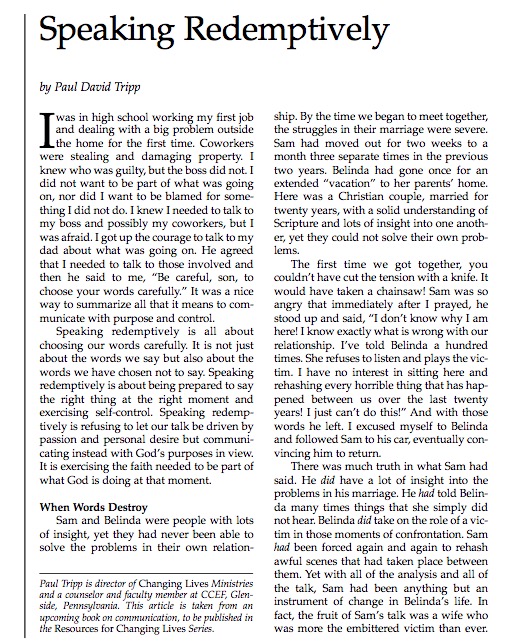[혁신주의] Speaking Redemptively
SpeakingRedemptively.pdf
74.0K 0 6년전
 [pdf보기] Speaking Redemptively by Paul David Tripp Iwas in high school working my first joband dealing with a big problem outsidethe home for the first time. Coworkerswere stealing and damaging property. Iknew who was guilty, but the boss did not. Idid not want to be part of what was goingon, nor did I want to be blamed for some-thing I did not do. I knew I needed to talk tomy boss and possibly my coworkers, but Iwas afraid. I got up the courage to talk to mydad about what was going on. He agreedthat I needed to talk to those involved andthen he said to me, “Be careful, son, tochoose your words carefully.” It was a niceway to summarize all that it means to com-municate with purpose and control.Speaking redemptively is all aboutchoosing our words carefully. It is not justabout the words we say but also about thewords we have chosen not to say. Speakingredemptively is about being prepared to saythe right thing at the right moment andexercising self-control. Speaking redemp-tively is refusing to let our talk be driven bypassion and personal desire but communi-cating instead with God’s purposes in view.It is exercising the faith needed to be part ofwhat God is doing at that moment. When Words Destroy Sam and Belinda were people with lotsof insight, yet they had never been able tosolve the problems in their own relation- ship. By the time we began to meet together,the struggles in their marriage were severe.Sam had moved out for two weeks to amonth three separate times in the previoustwo years. Belinda had gone once for anextended “vacation” to her parents’ home.Here was a Christian couple, married fortwenty years, with a solid understanding ofScripture and lots of insight into one anoth-er, yet they could not solve their own prob-lems. The first time we got together, youcouldn’t have cut the tension with a knife. Itwould have taken a chainsaw! Sam was soangry that immediately after I prayed, hestood up and said, “I don’t know why I amhere! I know exactly what is wrong with ourrelationship. I’ve told Belinda a hundredtimes. She refuses to listen and plays the vic-tim. I have no interest in sitting here andrehashing every horrible thing that has hap-pened between us over the last twentyyears! I just can’t do this!” And with thosewords he left. I excused myself to Belindaand followed Sam to his car, eventually con-vincing him to return. There was much truth in what Sam hadsaid. He did have a lot of insight into theproblems in his marriage. He had told Belin-da many times things that she simply didnot hear. Belinda did take on the role of a vic-tim in those moments of confrontation. Samhad been forced again and again to rehashawful scenes that had taken place betweenthem. Yet with all of the analysis and all ofthe talk, Sam had been anything but aninstrument of change in Belinda’s life. Infact, the fruit of Sam’s talk was a wife whowas more the embittered victim than ever. Paul Tripp is director of Changing Lives Ministriesand a counselor and faculty member at CCEF, Glen-side, Pennsylvania. This article is taken from anupcoming book on communication, to be published inthe Resources for Changing Lives Series. 10 The Journal of Biblical Counseling • Volume 16 • Number 3 • Spring 1998 With all of his insight, Sam was never part of what theLord was seeking to do in Belinda’s life. Rather, hestood in the way of the Lord’s work, and he consistent-ly gave the devil huge opportunities. Both Belinda and Sam had brought things into themarriage that contributed to their problems. Belinda’sfather was a brutally legalistic and critical man. Belindawatched her mother get verbally beaten night afternight at the supper table as her father would criticizeher housework, her cooking, her vocabulary, her looks,and even her voice (“that whiny screech of yours”).There had been many nights when Belinda wouldeither cry herself to sleep or think of ways to repay herfather for what he had done to her mom. When they began courting, Sam realized that Belin-da tended to be overly sensitive, and this would some-times irritate him. But since there were so many other things that he liked about Belinda, he tried to overlookit. He had little idea that he was marrying a womanwho was bitter, self-protective, fearful, and determinedto do whatever was necessary to keep herself fromgoing through the “hell” her mom had experienced. Sam’s parents, by contrast, had a wonderful rela-tionship. His mom and dad regularly expressed theirappreciation for one another. When they did quarrel,they would not only seek one another’s forgiveness butalso the forgiveness of any children who had witnessedthe quarrel. In Sam’s family, failure wasn’t consideredthe end of the world; rather, you would be encouragedto get up and try again. Sam had always hoped that hecould have a marriage like his parents’. He dreamed ofthose great times around the Christmas tree, this timewith him as the dad. He married Belinda with thisdream in view. It was not a mistake of God’s sovereignty that Samand Belinda got together. It was God’s wise redemptivepurpose to use their relationship as a workroom for hisongoing work of sanctification. In this relationship,hearts would be exposed and changed. This was God’spurpose. But Sam didn’t marry with the gospel in view;his eyes were on his dream. Belinda didn’t marry withthe gospel in view either; her eyes were on her fears. Soneither of them thought or spoke redemptively to theother when Sam began to see his dream crumble and Belinda began to see her fears realized. hear criticism even when it wasn’t there. And Belindaknew that Sam always seemed disappointed becausehis real family didn’t match up to the family of hisdreams. But despite all the insight, things betweenthem got progressively worse over the years. The talkthat surrounded their difficulties only added layers ofhurt and complication. Instead of demanding changein one another, Sam and Belinda needed to learn whatit means to speak redemptively in the face of disap-pointment, hurt, failure, and sin—all common experi-ences in a fallen world. Why Words Destroy How do we understand Belinda and Sam’s inabili-ty to solve the problems in their relationship? What isthe pathway to change for them? What does it mean forthem, and us, to choose our words, to speak redemptive-ly? A pointed passage in Galatians exegetes Sam andBelinda’s relationship. It is followed by another pas-sage that points the way to change. Both passagesdefine what it means to choose our words so that wemay be part of what the Redeemer is doing in our livesand in others. Let’s begin by looking at what has gone wrong withBelinda and Sam. Our diagnostic passage is Galatians5:13-15. You, my brothers, were called to be free. But donot use your freedom to indulge the sinfulnature; rather, serve one another in love. Theentire law is summed up in a single command:“Love your neighbor as yourself.” If you keepon biting and devouring each other, watch outor you will be destroyed by each other. The three parts of this passage can help us under-stand what is wrong with Sam and Belinda’s relation-ship, particularly in the area of their communication. 1. “Do not use your freedom to indulge the sinfulnature; rather, serve one another in love.” If you had asked Belinda and Sam if their relation-ship was based on an indulgence of the sinful nature,they would have emphatically said “no”—but theywould have been emphatically wrong. Their relation-ship and their communication were not shaped by therule of love. They sorely lacked the servant posture thatis urged in this passage. They did not ask God how they could be used toencourage their spouse and support what God wasdoing in the other’s life. They did not think about howthey could “spur one another on to love and good The First Great Commandalways precedes and determinesthe keeping of the Second. The Journal of Biblical Counseling • Volume 16 • Number 3 • Spring 1998 11 deeds” (Heb. 10:24). They did not look for ways to com-fort, encourage, warn, or teach the other person. Theydid not view difficulty as an opportunity to ministerGod’s grace. They did not look for ways to help theother person carry his or her load. They did not choosewords that would encourage unity, love, and mutualministry. Sam and Belinda looked to be served. Hewanted to enjoy his dream. She wanted insulation fromher fears. Thus they did not look for ways to serve. It is here that this passage is particularly helpfulbecause it tells us that the opposite of serving in love isnot a lack of love and a lack of service, but an activeindulging of the sinful nature! Either I am living as a ser- the desire for self-protection had taken over Sam andBelinda’s marriage. The result was, as James describes,constant conflict. 2. “The entire law is summed up in a single command:‘Love your neighbor as yourself.’” This also offers a significant insight into the rela-tionship. The problems in Sam and Belinda’s relation-ship were not fundamentally horizontal (person to per-son), but fundamentally vertical (person to God). If Iam living for God’s glory, if I hold this as a more fun-damental personal goal than my own happiness, if mylove for Him stands above my love for anyone or any-thing else, including myself, then my practical goal inlife will be to please God in everything I do and saywherever He puts me. One sure fruit of such a heartcommitment to God is that I will love my neighbor asmyself. The First Great Command always precedes anddetermines the keeping of the Second. I will never lovemy neighbor as myself if I am not first loving Godabove all else. James 4 is again helpful here. In verse 4, in the midstof his discussion of the causes and cures of human con-flict, James introduces the concept of spiritual adultery.Adultery occurs when the love that was promised toone is given to another. Spiritual adultery occurs whenthe love that belongs to God is given over to someaspect of the created world (see Romans 1:25). Jamessays something extremely helpful as we seek to under-stand the relationship between Sam and Belinda:human conflict is rooted in spiritual adultery! When adesire for a certain thing replaces love for God as thecontrolling force in my heart, the result will be conflictin my relationships. Conflict has vertical roots that pro-duce the horizontal fruit of fighting and quarreling.Love for God that makes me want to keep His law willalways result in practical love toward my neighbor. 3. “If you keep on biting and devouring each other,watch out or you will be destroyed by one another.” This last part of Galatians 5 is an apt description ofthe daily conversation between Belinda and Sam. Theybit and devoured one another with words. Their com-munication never built up, strengthened, or encour-aged. Rather, they were skilled in taking chunks out ofone another. Sam knew the places where Belinda wastender and vulnerable, and he would go after thoseplaces whenever he saw her in the way of his dream.Belinda knew where she could hurt Sam, and she coulddevour his joy or hope with a few well-placed words. Their words were critical, condemning, manipula-tive, threatening, judgmental, selfish, malicious,demanding, ruthless, and vengeful. Their words Our most significant humanrelationship (marriage) takes placein the middle of life’s most significantprocess (sanctification). vant of the Lord and accepting His call to serve thosearound me or I am living to gratify the cravings of thesinful nature and expecting others to satisfy those crav-ings as well. Although Belinda and Sam would haveinitially disagreed, they came to understand that theyhad entered their relationship with selfish desires at thecore. Sam was pursuing his goal of the perfect wife andfamily. Because of this he immediately became disap-pointed and angry when he saw Belinda as an obstacleto his goal. Belinda came into the marriage with thepersonal goal of self-protection. Her relationship andcommunication with Sam were dominated by a con-stant focus on self. (How is the world treating me?)Because of this self-protection goal, she picked aparteverything Sam said or did, and she was always able tofind something that was insensitive, critical, neglectful,or “abusive.” Then, in her disappointment, she lashedout in anger against Sam. James 4:1,2 explains how Belinda and Sam’s desiresaffected the dynamics of their relationship. “What caus-es fights and quarrels among you? Don’t they comefrom your desires that battle within you? You wantsomething but you don’t get it.” Theirs was a relation-ship of constant conflict because their two hearts wereruled by the desires of the sinful nature. James talksabout desires that battle within, desires that wage warto establish control over people, resources, “territory.”The battle between the desire for the perfect family and 12 The Journal of Biblical Counseling • Volume 16 • Number 3 • Spring 1998 revealed that Sam and Belinda did not need a radicalchange in their vocabulary as much as they needed aradical change at the level of the heart. This would fun-damentally alter the way they spoke to each another. The issue was not that they came into their marriagewith problems. This is true of all of us; moreover, Goddesigned marriage that way. This most significant ofhuman relationships exists not primarily for our plea-sure but as a means of His continuing work of sanctifi-cation, that we might be for the praise of His glory. It isno accident that our most significant human relation-ship (marriage) takes place in the middle of life’s mostsignificant process (sanctification). God has designed itthis way for His glory and the good of His children! It would be wrong for Sam and Belinda to say thattheir marriage came to this awful state because theywere cursed with unusual difficulty. The problem wasnot that they had problems. The core issue was the waythe desires of their hearts dictated their response toeach other in the midst of those problems. Because theywere living for themselves and not for God, they bitand devoured one another, almost to the point ofdestruction. Sam had been verbalizing doubt aboutGod’s faithfulness and love, and Belinda had quit goingto church altogether. Their faith lay wounded under thewreckage of their conflict. Hebrews says that the Bible is able to expose the“thoughts and attitudes of the heart” (Heb. 4:22f). Gala-tians 5 does exactly that for Sam and Belinda. Theirrelationship was not ruled by the law of love but by thedesires of the sinful nature. Because God was not incontrol of the system, they entered every situation look-ing to have their own dreams, desires, and demandsfulfilled. In their anger and disappointment with oneanother, they beat one another with words. Their wordstore at the fabric of their relationship because the fabricof their faith had already been torn in their hearts. Speaking Words of Redemption into a World of Sin Sam and Belinda show us that speaking redemp-tively is not a superficial matter of choosing the rightvocabulary, but a fundamental heart commitment tochoose words that promote God’s work in a particularsituation. Belinda and Sam had lost sight of the real warthat lies beneath human quarrels. They had begun tothink that their battle was with flesh and blood, and sothey fought each other to win the dreams that hadgripped their hearts. Their chief weapons were theirwords. What would it have meant for Sam and Belindato speak redemptively into this situation? Galatians 5 continues to provide helpful answers.So I say, live by the Spirit, and you will not grat-ify the desires of the sinful nature. For the sinful nature desires what is contrary to the Spirit, andthe Spirit what is contrary to the sinful nature.They are in conflict with each other, so that youdo not do what you want. But if you are led bythe Spirit, you are not under law. The acts of the sinful nature are obvious: sex-ual immorality, impurity and debauchery; idola-try and witchcraft, hatred, discord, jealousy, fitsof rage, selfish ambition, dissensions, factionsand envy; drunkenness, orgies, and the like. Iwarn you, as I did before, that those who livelike this will not inherit the kingdom of God. But the fruit of the Spirit is love, joy, peace,patience, kindness, goodness, faithfulness, gen-tleness and self-control. Against such thingsthere is no law. Those who belong to Christ Jesushave crucified the sinful nature with its passionsand desires. Since we live by the Spirit, let us keep in step with the Spirit. Let us not becomeconceited, provoking and envying each other. Brothers, if someone is caught in a sin, youwho are spiritual should restore him gently. Butwatch yourself, or you also may be tempted.Carry each other’s burdens, and in this way youwill fulfill the law of Christ (Gal. 5:16-6:2). it means to speak redemptively. Remember, speakingredemptively does not mean that we ignore the practi-cal concerns of life. We cannot, because we willencounter them every day. Rather, speaking redemp-tively speaks to these concerns in a way that promotesthe interests of the King in the following ways: 1. Speaking redemptively begins by recognizing thewar within. (See verses 16,17.) As long as indwellingsin remains, there will be a war within our hearts (Rom.7:7-15, Eph. 6:10-20, James 4:1-10). We must always liveaware of this conflict because to forget the presence andpower of indwelling sin will immediately lead to prob-lems in our talk. This is the conflict, the basis of everyother war we battle. We should never give in to think-ing that our primary battle is with flesh and blood (seeEph. 6:10-12). We must never allow ourselves to look at our hus-band, wife, parent, child, brother, sister, or friend as theenemy. When we do, our goal soon becomes horizontal The Journal of Biblical Counseling • Volume 16 • Number 3 • Spring 1998 13 Speaking redemptivelybegins with self-examination. winning, and redemptive speaking goes out the win-dow. There is only one enemy who is scheming, manip-ulating, tempting, deceiving, and masquerading to getus to forget the real battle and to tempt us to give in tothe desires of the sinful nature. We defeat the work ofthis enemy when we speak to one another out of anactive awareness of the real spiritual war within. 2. Speaking redemptively means never giving in tothe desires of the sinful nature as we talk. (See verse16.) All of us wrestle with a conflicting catalog ofdesires. When something has gone wrong, we maydesire that an appropriate, godly solution be found, butother desires are operating as well. We may desire toassess blame or to separate ourselves from responsibil-ity. We may desire to rehearse all the other times thisperson failed us or to have that person hurt as we hurt.We may desire to share the failure of this person withanother. We may be jealous that someone else is gettingthe attention we think we deserve. We may feel bitterand filled with hatred toward someone who has con-sistently failed us. We may be filled with rage. Speaking redemptively means saying no to anycommunication that would flow from these desires.Speaking redemptively does not start with examiningthe situation, the needs of the person(s) with whom weneed to talk, or the Scripture passages that would giveinsight into what we should say. No, speaking redemp-tively begins with self-examination. 3. Speaking redemptively means refusing to speakin any way that is contrary to what the Spirit is seek-ing to produce in me and others. (See verses 16-18.) Asa Christian, the most important thing in my life is thecompletion of God’s work in me and others, to thepraise of His glory. I never want to obstruct what He isdoing as Redeemer in the little moments of life. I rec-ognize that ultimately those moments do not belong tome but to Him. They are the workroom in which Hedoes His work of sanctification. My job is to be a usableinstrument in His redeeming hands. Any time I speakout of my own sinful desires, I am communicating in away that is contrary to what the Spirit is seeking to pro-duce in me. 4. Speaking redemptively involves a willingness toexamine how the fruit of the sin nature is present in mytalk. (See verses 19-21.) If I am seeking to live consis-tently with the Spirit’s work in me and not give roomfor the enemy, I must be willing to examine my talkwith the mirror of the Word of God. I want the “wordsof my mouth and the meditation of my heart” to bepleasing in the Lord’s sight (Ps. 19:14). So I look forwords of envy, jealousy, and pride. I look for words offaction, dissension, and division. I look for words ofanger, rage, malice, and hatred. I look for words of self- ishness, self-righteousness, self-protection and defen-siveness. I look for words that evidence impatience,irritation, a lack of forgiveness, unkindness, and a lackof gentleness. I look for talk that is coarse or materialis-tic. I do not examine myself with a morbid, discour-aged attitude of self-criticism. I do it with joy, realizingthat because of the indwelling presence of the HolySpirit, I do not have to live under the control of the sin-ful nature (Rom. 8:5-11). With joy I seek to please Himin every way in every situation! I want to speak in away that is worthy of the calling I have received (Eph.4:1). 5. Speaking redemptively means saying “no” to anyrationalization, blame-shifting, or self-serving argu-ments that would excuse talk that is contrary to thework of the Spirit, or that would make this talk lookappropriate or acceptable for a kingdom citizen. (Seeverses 19-21.) I was a young pastor of a struggling little congrega-tion with huge counseling needs. It seemed as if I neverhad a quiet moment at home without someone callingme with the latest, greatest crisis. I dreaded hearing thephone ring at night and dreaded even more the words,“Paul, it’s for you.” Although I did not realize it,increasingly I viewed certain people in the congrega-tion as obstacles to what I wanted rather than objects ofthe calling I had gladly accepted from the Lord. I canremember getting calls and saying to my wife, “Who isit now?!” but then answering with a friendly, pastoral“Hel-lo.” One Saturday afternoon I was relaxing at homewith my wife and children when I got a call from a des-perate young man. He had been desperate for a longtime and seemed to have the gift for calling me at all thewrong moments. He was always discouraged, alwaysasking for help, yet always resistant to the help thatwas offered. Nothing seemed to work for him. He pro-fessed to have tried everything without benefit. He wasat one of the seedy local motels, saying that he wasgoing to end his life once and for all. He said that unlesshe had a reason to live, he would kill himself before theday was over. I found out where he was, asked my wifeto pray, and got in my car to go and talk to him. I prayed on the way, and I knew that my wife waspraying, but there was a war going on within me. I wasthat catalog of conflicting desires! I really disliked thisman. I disliked his humped-shouldered posture. I dis-liked his whiny voice. I disliked his need to always bethe center of someone’s attention. I hated the way hehad spit back at me every insight I had offered. I resent-ed the time he had taken away from my family andother aspects of my ministry. And I was angry that I 14 The Journal of Biblical Counseling • Volume 16 • Number 3 • Spring 1998 had to go once more to put him back together. As Idrove, my thoughts were pulled back and forth in thewar between pastoral concern and personal resent-ment. I arrived at the motel, and we sat in a dingy roomthat smelled of smoke and sweat. He gave me his nor-mal litany of complaints. I began to respond with truthsfrom the gospel when he interrupted me and said,“You’re not going to trot out that stuff again, are you?Don’t you have anything new to say?” I couldn’tbelieve what I was hearing. Here I had willingly left myfamily out of concern for him, and he mocked myefforts to help without any appreciation! I lost it, givingin to the rage that had been building for weeks. I ver-bally tore him limb from limb. I told him exactly what Iand the congregation thought of him. I laid as muchguilt on him as I could, told him to get up off his duffand do something right for a change, prayed for him(!)and left. I was seething as I drove away. It didn’t take long for conviction to set in as I drovehome. It also didn’t take long for rationalization andself-excusing arguments to set in right behind them. Bythe time I arrived home, I was convinced that I had spo-ken like one of the prophets of old, proclaiming a “thussays the Lord” in a sinful and rebellious place. I hadconvinced myself that God would use this dramaticmoment of truth to create lasting change in this man’slife. I arrived home, and my wife, who had been pray-ing, asked me how the time had gone. I told her that Ihad spoken to him more strongly than I had ever spo-ken to anyone in my ministry. I made sure I used theprophet analogy with her. She immediately said, “Itsounds to me like you got angry and blew it.” Themoment she said those words, I saw my self-servingrationalizations for what they really were, and I wasfilled with remorse. As it turned out, God used my sub-sequent confession of my own sin and struggle withthis man to begin to turn him around. God wants us to not only listen for talk that is con-trary to the work of the Spirit but also for ways werationalize sinful talk to make it acceptable to our con-sciences. 6. Speaking redemptively means speaking “in stepwith the Spirit.” (See verse 25.) Keeping in step withthe Spirit means a commitment to speak in a way thatis consistent with His work in me and that encouragesHis work in another. In this passage the Spirit’s work ismade quite clear. He is working to produce in us a har-vest consistent with the character of Christ: love, joy,peace, patience, kindness, goodness, faithfulness, gen-tleness and self-control. Speaking in step with the Spir-it means that as an act of faith and submission, I holdmy speaking up to the standard of this spiritual fruit. And I look at the difficult situations of life as sover-eignly-given opportunities to see this fruit mature inme by His grace. Difficulties are not obstacles to thedevelopment of this fruit, but opportunities to see itgrow. Years ago there was a man in our congregation whowas particularly critical of my ministry. I struggledinside whenever I saw this man or even thought of him.I can remember being relieved when I would arrive at achurch event and discover that he was not there. I was also aware that he was not keeping his opinions to him-self. He had begun to gather a group of like-mindedfolk around himself. Our congregation was not large,and thus the discontent was becoming more and moreobvious. I decided that it was time to ask this man if wecould talk. I told my wife that I was planning to talkwith Pete (not his real name). She immediately askedme what I was planning to say. As I shared my thoughtswith her, I could sense that she was responding nega-tively, so I asked her what was wrong. She said, “Beforeyou can deal with him, Paul, you have to deal withyourself. It sounds to me like you hate this man. I don’tthink any good can come out of confronting him withhis wrong until you deal with your own attitudes.” I wanted to think that Luella was just another per-son who was misunderstanding and misjudging me,but she wasn’t. Truer words have never been spoken. Ihated this man. I hated the controlling effect he had onme. I hated the fact that he had turned others againstme. I hated the way his criticism had caused me to sec-ond-guess everything I did as a pastor! I hated the wayhe had destroyed my dream for my ministry and ourcongregation. I hated the arrogant smirk on his face. Ididn’t really want to deal with him. I just wanted himout of my life! Luella was right. I was in no condition to be aninstrument of the Spirit in Pete’s life. I was in no posi-tion to speak redemptively. I was totally out of step withthe Spirit in regards to this relationship. I did need todeal with me first. I did need to examine my heart andconfess the sin that was there, and I did need to deter-mine to speak in a way that was consistent with thefruit the Spirit was working in me. As I examined my heart, there was more there that The very man I hated The Journal of Biblical Counseling • Volume 16 • Number 3 • Spring 1998 15 needed to change than I had ever thought. My problemwas not just hatred and anger, but sins at an even deep-er level. Much of what had been motivating me in min-istry was not the work of the Lord, but my personaldream. I had dreamed of going into a tough area tominister and being successful in a way no one else hadbeen. I had dreamed of being highly respected by anever-growing congregation and, before long, the entireChristian community. I had dreamed of great numeri-cal growth, of building a large, modern facility, and ofleading the “mover-and-shaker church” in the region.Most of all, I had dreamed that I would be looked on asthe one at the center of it all. I hated this man because he was right! He was notright in the way he had dealt with his concerns aboutmy ministry, but he was right in his insight into my pride. I did enjoy being at the center of every gathering.I did have the final opinion on every topic. I was frus-trated when people would get in the way of my novelprograms. I hated how slowly things moved and hownegative people were. And I struggled with God forputting me in this hard place. The very man I hated began to be an instrument ofrescue in the hands of the Lord. Through Pete my self-ish, arrogant dream was exposed and began to die.Under the heat of this trial, God showed me the sin inmy heart in a new way. As I took several days to exam-ine myself and this situation, I began to be thankful forthe very man I had hated. I was not thankful for his sin,but I was thankful for the way God had used him in mylife. As I became thankful, I began to listen to what Petehad said about me and the way he had said it. I realizedthat there were things God wanted me to learn evenfrom this harsh messenger. Finally, as I listened to theway he communicated his thoughts, I discovered thathe and I were a lot alike. Pete was proud, opinionated,vocal, and impatient. I had hated all those things butlearned that they were present in me as well. In those days God gave me a genuine, pastoral lovefor Pete; and when we talked, I was able to communi-cate to him in a way that was patient, kind, gentle,peaceful, and self-controlled. I was even able to go intothis difficult talk with joy as I reflected on the good thatthe Spirit had done in me through him. Speaking in step with the Spirit not only means speaking in a way that is consistent with what the Spir-it is doing in me; it also means speaking in a way thatencourages the growth of this fruit in you. Frankly,before Luella spoke to me, I didn’t care if God used mein Pete’s life. There were only two things I cared about:I wanted to proved Pete wrong, and then I wanted himto leave our church and leave me alone! I had falleninto thinking that my struggle was with “flesh andblood” (Eph. 6:10-12). I saw Pete as the enemy to bedefeated, and I had lost sight of the spiritual warfaregoing on beneath the surface. I did not want to servePete; I wanted him to support my dream. Even as hispastor, the last thing I wanted was to be a tool ofredemption in his life. I had never even consideredbeing a tool that the Spirit could use to produce goodfruit in his life until my talk with Luella. When I finally did talk with Pete, I had a radicallydifferent agenda from the one I had first discussed withmy wife. I no longer wanted to “win.” I no longer want-ed him to shut up and be a compliant part of mydream. I really did want to be used of God to producethe fruit of the Spirit in Pete. He came to our talk readyfor battle. It was clear that he had prepared hisweapons and rehearsed his defenses. But there was nobattle. I told him that I was thankful for his insights;that through him the Spirit had really exposed myheart, and I asked for his forgiveness. Before I even hada chance to talk about him, he said, “Paul, I’ve beenwrong too. I guess if I were honest I would have to saythat I have hated you and I have looked for everyopportunity to criticize you to others. I have been angryat you and angry at God for putting us in this congre-gation. I need your forgiveness.” That night, for the first time in a long time, Pete andI spoke in step with the Spirit, and the Spirit producednew growth in each of us. But don’t miss the point: itstarted with someone confronting me and encouragingme to examine my own heart before I confronted Pete.Speaking in step with the Spirit means taking time tolisten, examine, reflect, and prepare. It means commu-nicating out of a commitment to participate in the Spir-it’s continuing work of grace in our lives and others. 7. Speaking redemptively means giving no place tothe passions and desires of the sinful nature. (See vers-es 24,16.) Pay careful attention to the words of verse 24:“Those who belong to Christ have crucified the sinfulnature with its passions and desires.” Notice that this isnot a passive passage. It says that when we come toChrist, we crucify the passions and desires of the sinfulnature. This passage directs us to consider an aspect ofthe gospel that is often omitted. The gospel is a gloriousmessage of comfort, of sins forgiven, condemnation lift-ed, relationship with God reconciled, Spirit given, and Our mouths can be instrumentsof righteousness! 16 The Journal of Biblical Counseling • Volume 16 • Number 3 • Spring 1998 eternity guaranteed. But the gospel is also a call to for-sake living according to the cravings of the sinful natureso that we might live for Christ. True salvation is notonly about receiving comfort; it is also about answeringthe call. This once-and-for-all commitment to godly liv-ing, crucifying the passions and desires of the sinfulnature, must then be lived out by the indwelling powerof Christ in all of our relationships and situations. There is no place where this commitment is moreneeded than in the area of our communication. If wewere humbly honest, we would admit that much ofwhat we say is driven by the passions and desires of thesinful nature, not by a commitment to the will andwork of Christ. Husbands who let angry criticism fly attheir wives, wives who give in to grumbling and com-plaining, children who lash out in anger against theirparents, parents who in frustration beat their childrenwith words, disappointed members of the body ofChrist who slander their leaders are all giving way tothe passions and desires of the sinful nature. The resultis a harvest of bad fruit in broken relationships andunresolved, increasingly complicated problems. To speak words that are shaped by the emotions anddesires of the sinful nature is to deny both Christ’spromise of freedom from sin’s dominion and our com-mitment to live as those who belong to Him. Speakingredemptively means speaking out of the powerful self-control that Christ has given us, the One who broke thebonds of our slavery to sin and who gave us the gift ofHis indwelling Spirit. Our mouths can be instrumentsof righteousness! We can say “no” to the emotions anddesires of the sinful nature. 8. Speaking redemptively means having a restora-tive view of relationships. (See chapter 6, verses 1 and2.) Paul says, “Brothers, if someone is caught in a sin,you who are spiritual should restore him gently.” Paul then says, “You who are spiritual shouldrestore him gently.” When we are “keeping in step withthe Spirit” (verse 25), we position ourselves to be one ofHis restorers. Speaking redemptively means letting this restora-tion agenda direct our relationships. We are all tempted to think that our relationships belong to us. We tend toview other people as our possessions. Parents fall intothis with their children; then, in the teenage years,when the child fails, the parents are unable to seebeyond their own anger and hurt to be agents ofrestoration for their own offspring! Husbands andwives believe that it is their mate’s responsibility tomake them happy. Life becomes a series of final exams.We judge people according to the way they respond tous, the way they affect us. We look for proper respect, love, appreciation, acceptance, and honor; and we findit very hard to continue in relationships where thosethings do not exist. Paul is calling us to something radically differenthere. This new agenda has its roots in the fundamentalrecognition that our relationships do not belong to usbut to God. Once we begin to think of our relationshipsthis way, we begin to see the need for restoration allaround us. When you’re on a vacation and the childrenare quarreling in the back seat, there is more going onthan your expensive vacation being ruined! The needfor restoration is revealing itself. You can respond tothis situation as an irritated parent whose children arerobbing him of his vacation dream, or you can respondas a restorer who wants to be a tool in the hands of thegreat Restorer. When husbands and wives disagree over the sameold stuff once again, they need to do more than cursethe fact that their marriage doesn’t work or that theother person never has a clue. They need to discoverwhere they are “caught” and they need to respond toone another, not with a demand agenda, but with arestoration agenda. The greatest work of human rela-tionships is not the pursuit of human happiness but rec-onciliation to God and restoration to the image of HisSon. 9. Speaking redemptively means speaking withhumility and gentleness. (See chapter 6, verse 1.) Harshtalk (“Why don’t you just get your act together?” “Ifyou think I’m going to keep cleaning up your messes,you’ve got another think coming!”) and prideful talk(“In my day,” or “I just can’t relate to people who dothat!”) in the face of another’s weakness, temptation,and sin simply contradicts the message of the gospel. Gentleness should be our natural response when we The Journal of Biblical Counseling • Volume 16 • Number 3 • Spring 1998 17 We are easily caught in sin. Becauseof this, we need one another. see a brother or sister ensnared in sin. We must recog-nize that except for God’s grace, we would be wherethey are. Thus we should respond to them with thesame grace we have received. God loved us when wewere unlovely. He has forgiven us in the face of repeat-ed sin. In fact, it is His love that draws us out of thedarkness toward His marvelous light. In our commu-nication with one another, as we all struggle with thereality of remaining sin, it is vital that we mirror thecompelling love of Christ. He is our only argument, our 10. Speaking redemptively means other-centeredliving and other-centered communication. (See Gal.6:2.) The picture here is of people on a journey. They arenot just focused on what they have to carry but arelooking around for those who need assistance. Withthese words, “Carry each other’s burdens,” Paul broad-ens his call to us. He calls us to look beyond personalcomfort, success, and good to see the person strugglingto carry his load, and to share the weight. This is theway of Christ. We are also called to speak to one another out of this“burden-bearing” mentality. When we see someonestruggling with weakness, we point him to the strengthhe has in Christ. When someone is ignorant, we speakto her with wisdom-giving words of truth. When some-one is fearful, we talk of the God who is an ever-presenthelp in trouble. When someone grieves, we seek tobring words of comfort. When another is discouraged,we seek to bring words of hope. When feeling alone,we greet them with expressions of our love and Christ’spresence. When angry, we point to a God of righteous-ness, vengeance, and justice. When engaged in conflict,we seek to speak as peacemakers and reconcilers.When anxious, we point to the Sabbath of rest thatChrist had given His children. Speaking redemptively means choosing our wordscarefully. We do not want to indulge the passions anddesires of the sinful nature. We do not want to provokeanother to sin through our own conceit and envy. Wedo not want to bite and devour one another withwords. Rather, we are committed to serve one anotherin love with our words. We want to speak in step withwhat the Spirit is seeking to produce in us and in oth-ers. We want to speak in a way that is consistent withHis fruit and that encourages the growth of that fruit inothers. Finally, we want to speak as gentle, humbleagents of restoration, as burden-bearers who are com-mitted to live by Christ’s rule of love. What radical revival, reconciliation, and restorationwould result in our churches, homes, and friendships ifwe carried this call into every relationship and everysituation! How different things would be if we wereconsistently committed to speaking redemptively!How completely different Belinda and Sam’s relation-ship would have been if they had answered God’s callto speak to one another with words of redemption!How important it is for us to choose our words well! The greatest work of human relationshipsis not the pursuit of human happinessbut reconciliation to God andrestoration to the image of His Son. only hope. He alone is able to change our hearts. Wewant to talk in such a way that draws people to hope inHim. We are also free to be gentle because we have givenup any hope that human pressure, power, or logic canchange the heart. It is never the loudness of our voice,the power of our words, the drama of the moment, thecreativity of our illustrations, the strength of our vocab-ulary, the specter of our threats, or the grandeur of ourgestures that causes a turning within people. Gentle-ness flows from knowing where our power lies. Godcan use whispered words to produce thunderous con-viction in a heart. Yes, we want to think and speak well,but only because we want to be useful instruments inthe hands of the One who does bring change, notbecause we trust our skills to produce it. Gentle talk does not come from a person who isangry and looking to settle the score. It comes from theperson who is speaking not because of what he wantsfrom you but what he wants for you. I am able to speakgently only when I am not speaking out of personalhurt, anger, and bitterness but out of self-sacrificing,redemptive love. I speak to you, not because your sinhas affected me, but because it has ensnared you. I longto see you freed from its snare. I am not on a mission ofselfish confrontation but loving rescue. And I knowthat in some way we all need this rescue daily. 18 The Journal of Biblical Counseling • Volume 16 • Number 3 • Spring 1998
|















